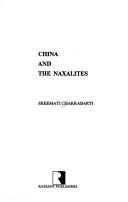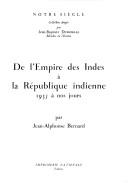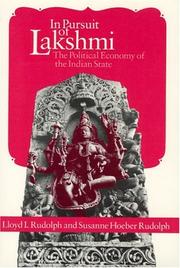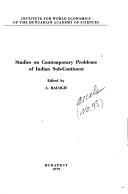| Listing 1 - 10 of 16 | << page >> |
Sort by
|
Book
ISBN: 0803991169 Year: 1993 Publisher: New Delhi Newbury Park, Calif. Sage Publications
Abstract | Keywords | Export | Availability | Bookmark
 Loading...
Loading...Choose an application
- Reference Manager
- EndNote
- RefWorks (Direct export to RefWorks)
Book
ISBN: 1316340945 1316257002 Year: 1987 Publisher: Cambridge : Cambridge University Press,
Abstract | Keywords | Export | Availability | Bookmark
 Loading...
Loading...Choose an application
- Reference Manager
- EndNote
- RefWorks (Direct export to RefWorks)
The Politics of India since Independence provides a comprehensive study of the major political, cultural, and economic changes in India since gaining independence. Paul Brass focuses on the consequences of the centralising drives of the national leadership to create a strong, unified nation, and a dynamic economy, all of which have been put into jeopardy in recent years by increased inter-caste conflicts, the rise of militant Hindu nationalism, and the worst communal massacres since Independence. In the second edition of his book, the author takes account of recent events to ask whether the country can find the right leadership to restore a political and communal balance in state and society.
India --- Politics and government --- India--Politics and government--1947-.
Book
ISBN: 0521459702 0521453623 Year: 1994 Volume: 1 Publisher: Cambridge university press
Abstract | Keywords | Export | Availability | Bookmark
 Loading...
Loading...Choose an application
- Reference Manager
- EndNote
- RefWorks (Direct export to RefWorks)
India --- Inde --- Politics and government --- Politique et gouvernement --- 1947 --- -India - Politics and government - 1947 --- -India --- India - Politics and government - 1947-
Book
ISBN: 0521266130 0521396514 Year: 1990 Volume: 1 Publisher: Cambridge New York Cambridge University Press
Abstract | Keywords | Export | Availability | Bookmark
 Loading...
Loading...Choose an application
- Reference Manager
- EndNote
- RefWorks (Direct export to RefWorks)
India --- Inde --- Politics and government --- Politique et gouvernement --- #SBIB:328H54 --- Instellingen en beleid: India --- -#SBIB:328H54 --- -India --- 1947 --- -India - Politics and government - 1947 --- India - Politics and government - 1947-

ISBN: 8170271517 Year: 1990 Publisher: New Delhi Radiant Publishers
Abstract | Keywords | Export | Availability | Bookmark
 Loading...
Loading...Choose an application
- Reference Manager
- EndNote
- RefWorks (Direct export to RefWorks)

ISBN: 211081330X 9782110813305 Year: 1994 Volume: *31 Publisher: Imprimerie nationale
Abstract | Keywords | Export | Availability | Bookmark
 Loading...
Loading...Choose an application
- Reference Manager
- EndNote
- RefWorks (Direct export to RefWorks)
India --- Politics and government --- History --- 20th century --- India - Politics and government - 1919-1947 --- India - Politics and government - 1947 --- -India

ISBN: 0226731391 9780226731391 Year: 1987 Publisher: Chicago (Ill.) University of Chicago Press
Abstract | Keywords | Export | Availability | Bookmark
 Loading...
Loading...Choose an application
- Reference Manager
- EndNote
- RefWorks (Direct export to RefWorks)
Book
ISBN: 025319315X 9780253193155 Year: 1979 Publisher: Bloomington: Indiana university press,
Abstract | Keywords | Export | Availability | Bookmark
 Loading...
Loading...Choose an application
- Reference Manager
- EndNote
- RefWorks (Direct export to RefWorks)
Book
ISBN: 9781107032965 9781139519076 1139519077 1107327075 1107238137 1107332729 110733683X 1107333512 1107335175 1299399940 1107336007 9781107333512 9781107336834 9781107335172 1107032962 9781299399945 1316635244 Year: 2013 Publisher: Cambridge New York Cambridge University Press
Abstract | Keywords | Export | Availability | Bookmark
 Loading...
Loading...Choose an application
- Reference Manager
- EndNote
- RefWorks (Direct export to RefWorks)
Under what conditions are some developing countries able to create stable democracies while others have slid into instability and authoritarianism? To address this classic question at the center of policy and academic debates, The Promise of Power investigates a striking puzzle: why, upon the 1947 Partition of British India, was India able to establish a stable democracy while Pakistan created an unstable autocracy? Drawing on interviews, colonial correspondence, and early government records to document the genesis of two of the twentieth century's most celebrated independence movements, Maya Tudor refutes the prevailing notion that a country's democratization prospects can be directly attributed to its levels of economic development or inequality. Instead, she demonstrates that the differential strengths of India's and Pakistan's independence movements directly account for their divergent democratization trajectories. She also establishes that these movements were initially constructed to pursue historically conditioned class interests. By illuminating the source of this enduring contrast, The Promise of Power offers a broad theory of democracy's origins that will interest scholars and students of comparative politics, democratization, state-building, and South Asian political history.
Democracy --- Authoritarianism --- India --- Pakistan --- Politics and government --- Democracy. --- Authoritarianism. --- Political science --- Authority --- Self-government --- Equality --- Representative government and representation --- Republics --- Politics and government. --- Social Sciences --- Political Science --- India - Politics and government - 1947 --- -Pakistan - Politics and government

ISBN: 9633010527 9789633010525 Year: 1979 Volume: 98 Publisher: Budapest Institute for World Economics
Abstract | Keywords | Export | Availability | Bookmark
 Loading...
Loading...Choose an application
- Reference Manager
- EndNote
- RefWorks (Direct export to RefWorks)
Political systems --- Third World: economic development problems --- India --- South Asia --- Politics and government --- Economic conditions --- Developing countries: economic development problems --- India - Politics and government - 1947 --- -India - Economic conditions - 1947 --- -South Asia - Politics and government --- South Asia - Economic conditions
| Listing 1 - 10 of 16 | << page >> |
Sort by
|

 Search
Search Feedback
Feedback About UniCat
About UniCat  Help
Help News
News